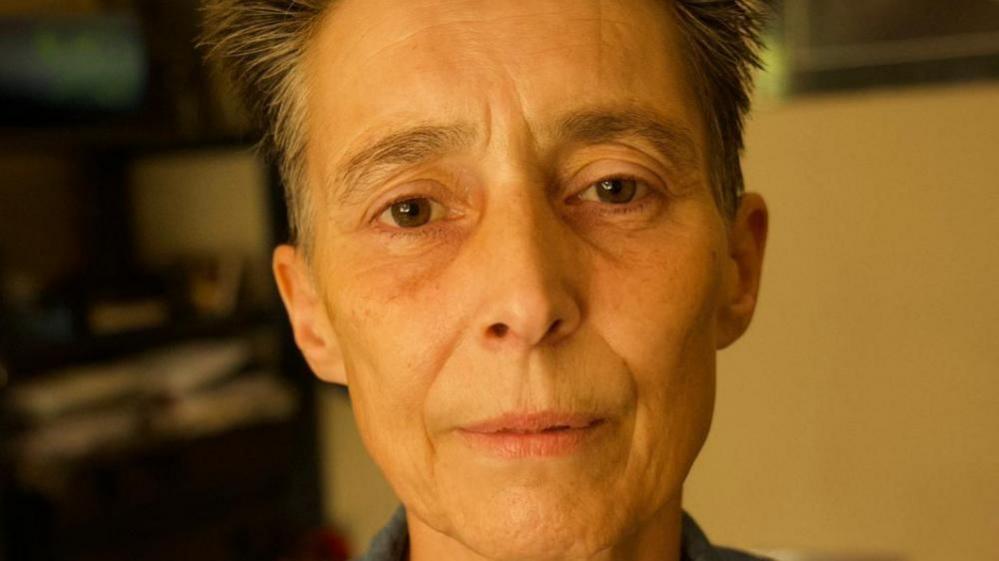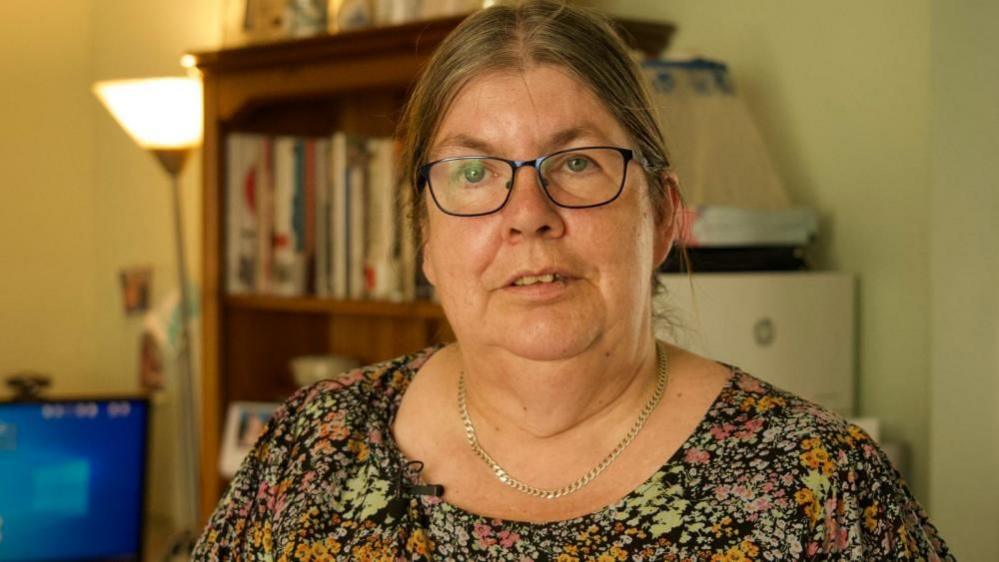apology
‘Just say sorry’, say forcibly adopted women
https://www.bbc.co.uk/news/articles/czdvg3y1jgeo
‘Just say sorry’, say forcibly adopted women

Fiona Irving & Jody Sabral
BBC News, South East
Cash Murphy
BBC News, South East
- Published14 July 2025
Two Kent women who were removed from their mothers when they were just weeks old and forcibly adopted say they need the government to formally apologise in order to help them recover from the trauma.
“Why can’t they just say sorry? They haven’t got the guts,” said Helen Weston from Yalding who was taken from her 15-year-old mother when she was 12 days old.
Nikki Paine, from Ashford, who was adopted at six weeks old, and was diagnosed with PTSD, says she just wants an acknowledgement of what happened to her.
A demonstration is due to take place on Wednesday to urge the government to apologise to the hundreds of people forcibly adopted during the 1950s, 1960s and 1970s as well as their mothers.
An inquiry by the human rights select committee, undertaken in 2021, looked at the experiences of children adopted across this period because their parents were either underage or not married.
Published in July 2022, its report recommended a formal apology after finding that babies were taken from mothers who did not want to let them go.
The Welsh and Scottish governments have officially apologised to those affected by forced adoptions, but the UK government so far has not.
‘Wracked with guilt’
Ms Weston said: “If we get the validation then maybe my birth mother won’t be so wracked with guilt and shame and keeping this dreadful secret.”
She was adopted in 1967 after her teenage mother was forced to give her up.
She says it has had a profound impact on her life and was diagnosed with complex PTSD.
“I’m not angry with anybody, I think that’s why I get so depressed,” she said.
“If there was one person I could be angry at, if one person was responsible, then I could give them a gob full and get rid of it.
“They genuinely thought they were doing the best for us.”

Ms Paine, who has also been diagnosed with complex PTSD, will be among those demonstrating in Westminster on Monday.
She said: “We’re all suffering from anxiety, we’re all on antidepressants.
“The apology would get the mental health support and that’s really important.”
She said: “We want this to be recognised because they took me away from my mother.
“I’m 63-years-old and it’s still affecting my life.”
‘I wanted my real mum’
Wednesday’s protest has been organised by adoptee advocate Zara Phillips, and is supported by the Movement for an Adoption Apology.
According to the group, between 1945 and 1976 an estimated 215,000 women had their children taken away from them.
A spokesperson for the group said: “We are all growing older and time is running out.
“We have been ignored by successive governments and now urgently need a public apology for this very personal and painful lifelong trauma.”
They said: “A public apology would help mothers and adoptees change the narrative around what was done to them.
“It would acknowledge the injustice and the loss which will endure for the rest of their lives.”
Some adoptees say they feel like they do not belong in their adoptive families especially when their adoptive parents have their own birth children.
Ms Weston said: “I was adopted into a family who had two children of their own, the dynamic with my adopted family was that I was always a problem child,” said Mrs Weston.
Ms Paine echoed this sentiment, saying: “I told my mother that she never hugged me, but she said you never wanted me to, and I thought how can you say that, but of course I wanted my real mum.”
The Department for Education has been approached for a comment.
‘We had our babies taken from us we didn’t give them away’
‘We had our babies taken from us we didn’t give them away’
Jeannot Farmer urges Scottish Government to get answers for victims affected by historic forced adoption ‘before it is too late.’ Women who were forced to give their babies up for adoption have made an urgent plea for help finding out what happened to their children. Campaigners said the words in an apology made by the Scottish Government last year “lose their worth every day” without measures to help victims of the “ongoing injustice”. It comes a year after former first minister Nicola Sturgeon delivered an official apology in the Scottish Parliament to those who have been affected by historic forced adoption policies. The recognition was the first formal apology in the UK to tens of thousands of unmarried mothers “shamed” and “coerced” into having their babies adopted. Group Movement for an Adoption Apology sent a letter and knitted baby bootees to over 60 MSPs urging them to back the campaign. Jeannot Farmer warns time is running out for families. She told STV News: “We chose to put out a statement expressing concern that people are still passing away not knowing what happened to their children. The pain associated with that is severe. I know what it was like to find my son after 31 years and how every birthday was worse than the last one not knowing where he was. I can’t imagine that being doubled. We have friends in that situation. Living with the stigma all of those years is very difficult. But the stigma is nothing compared to the loss of your child.”
Jeannot was one of thousands of women forced to give up her baby for adoption. At the age of 22, she gave birth to a boy while she was still a fourth year university student. Despite having explored options with social services, she did not want to give up her son. However, she was told while she was in hospital that her baby would be put up for adoption. “Sometimes I go back to the apology to remember what was said. Words like ‘historic injustice’ are meaningful and important. What happened was cruel,” she said.
“That day, the stigma and disgrace of giving my baby up for adoption was removed from me. Now I don’t have anyone thinking I have submitted my child for adoption voluntarily. That was done to me. My child was not taken, not given.”
It is estimated around 60,000 women in Scotland were forced to give up their babies throughout the 1950s, 1960s and 1970s. Hundreds of thousands of children were given up for adoption between 1949 and 1976 across the UK, at a time when unmarried mothers were often rejected by their families and ostracised by society. Adoptions were generally handled through agencies run by the Church of England, the Roman Catholic Church and the Salvation Army. What you’ll find is most mothers it happened to don’t really know what happened to them,” Jeannot said.
“We had this idea mothers giving babies up for adoption analysed the risks and benefits of keeping or giving them up, then came up with a rational decision. That happened to no one. A far more common story is the mothers gave birth, were sent to another room to hold the baby for a minute, then that baby was gone and never seen again.”
The group Movement for an Adoption Apology made a number of recommendations, such as councils delivering trauma-informed counselling services; easier birth record access; reunion services and formal apologies from institutions which administered services that resulted in coerced or forced adoption. But campaigners insist measures discussed in the Parliament on that day have “failed to emerge”. While work is currently underway to deliver funding for peer-support services, Jeannot said more work must be done to allow victims to access records. The system is already in place in states across Australia, where around 250,000 are estimated to have been affected by the practice. Jeannot said thousands risk being left with unanswered questions about their identity without the government taking action. “It’s incredibly urgent,” Jeannot said. “People are dying. People should be allowed to know the name of the person they have lost and find out if they might still be alive. We are losing the opportunity to pass on important information to our families and pass on a legacy for their relatives. Those questions, the hurt and the grief does not end with the passing of the father and the mother. Those ripples extend beyond. It’s also about passing on medical information; if a mother, sister or aunt has breast cancer, there is no way to tell a daughter who was adopted to get tested for the gene. It’s about what the children inherit too; ‘why do I have that shape of my nose?’ ‘Why am I good at art?’ People want to know these things.”
Jeannot said that it is important to remember mothers and adoptees reserve the right to refuse contact. She added: “People have a right to privacy, but people also have a right to information. It’s about a balance in-between those two things. But if our children had been taken by a random stranger, no one would question our right to know who they are. That’s what happened to our children who were taken. We didn’t give them away.”
Marking the anniversary Natalie Don, Minister for Children, Young People and Keeping the Promise said: “I acknowledge the immense pain and suffering that adoptees, mothers and families have endured as a result of these unjust practices. Addressing the harms caused remains a priority for this Government. We are establishing a series of lived experience sessions on historic forced adoption, to be facilitated by the Scottish Government’s Principal Psychological Adviser. These sessions will explore collaborative solutions and will discuss what form of support is needed to address the emotional and psychological impact of historic forced adoption for adoptees, mothers and families. We are also exploring what more we can do to ensure people affected by historic forced adoption are able to easily access the right information and support when they need it. This includes working with both the National Records of Scotland and Scottish Court and Tribunals Service in order to assist people with the practical aspects of accessing records, as well as signposting to further support. We continue to fund the charity, Health in Mind, to provide specialist support through peer support groups. Monthly peer support sessions are now being held for mothers and an adoptees group will begin shortly.”